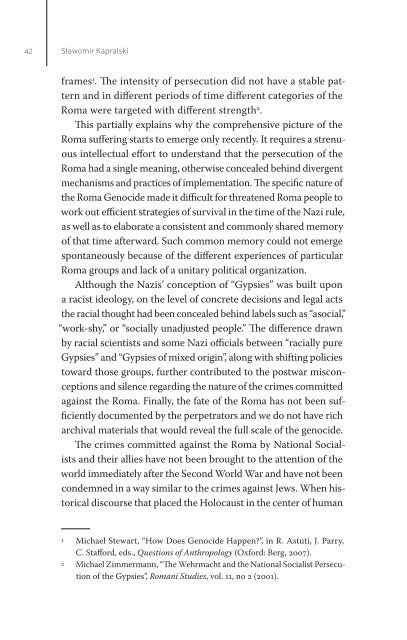FOR REMEMBRANCE OF THE ROMA GENOCIDE
6Zcx0LQui
6Zcx0LQui
You also want an ePaper? Increase the reach of your titles
YUMPU automatically turns print PDFs into web optimized ePapers that Google loves.
42<br />
Sławomir Kapralski<br />
frames 1 . The intensity of persecution did not have a stable pattern<br />
and in different periods of time different categories of the<br />
Roma were targeted with different strength 2 .<br />
This partially explains why the comprehensive picture of the<br />
Roma suffering starts to emerge only recently. It requires a strenuous<br />
intellectual effort to understand that the persecution of the<br />
Roma had a single meaning, otherwise concealed behind divergent<br />
mechanisms and practices of implementation. The specific nature of<br />
the Roma Genocide made it difficult for threatened Roma people to<br />
work out efficient strategies of survival in the time of the Nazi rule,<br />
as well as to elaborate a consistent and commonly shared memory<br />
of that time afterward. Such common memory could not emerge<br />
spontaneously because of the different experiences of particular<br />
Roma groups and lack of a unitary political organization.<br />
Although the Nazis’ conception of “Gypsies” was built upon<br />
a racist ideology, on the level of concrete decisions and legal acts<br />
the racial thought had been concealed behind labels such as “asocial,”<br />
“work-shy,” or “socially unadjusted people.” The difference drawn<br />
by racial scientists and some Nazi officials between “racially pure<br />
Gypsies” and “Gypsies of mixed origin”, along with shifting policies<br />
toward those groups, further contributed to the postwar misconceptions<br />
and silence regarding the nature of the crimes committed<br />
against the Roma. Finally, the fate of the Roma has not been sufficiently<br />
documented by the perpetrators and we do not have rich<br />
archival materials that would reveal the full scale of the genocide.<br />
The crimes committed against the Roma by National Socialists<br />
and their allies have not been brought to the attention of the<br />
world immediately after the Second World War and have not been<br />
condemned in a way similar to the crimes against Jews. When historical<br />
discourse that placed the Holocaust in the center of human<br />
1 Michael Stewart, “How Does Genocide Happen?”, in R. Astuti, J. Parry,<br />
C. Stafford, eds., Questions of Anthropology (Oxford: Berg, 2007).<br />
2 Michael Zimmermann, “The Wehrmacht and the National Socialist Persecution<br />
of the Gypsies”, Romani Studies, vol. 11, no 2 (2001).


